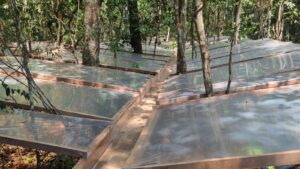Evaluating Impacts of Drought on Belowground Processes in Southern Amazonia

Context: Climate Change in Southern Amazonia
The Southern Amazon faces the greatest climatic threat of all Amazon regions. This region is drier and warmer than ‘core’ areas of the Amazon and has been subject to the most pronounced drying and warming trends. Furthermore, it is also the region of the Amazon where tree species exhibit the most water stress (Tavares et al. 2023) and where atmospheric measurements suggest forests are no longer acting as carbon sinks but as net sources of carbon to the atmosphere (Gatti et al. 2021). Given that Southern Amazon is at the front line of the Amazon’s battle against climate change, we urgently need to understand how drought impacts the functioning of these forests.
Integration with Ecosystem-scale drought Experiment in Southern Amazonia
This PhD will build directly upon a new 1-ha rainfall exclusion experiment established through a NERC grant to better understand the physiological survival limits of southern Amazon trees (Lethal Psi). The experiment is now fully functional and began excluding rainfall in October 2024. This PhD will integrate data currently collected at the drought experiment site and nearby control (undroughted) site with new measurements to better under how drought impacts soil and root processes that affect the absorption of water and nutrients by plants. Data currently collected at the site includes soil water content and soil water potential, soil respiration fluxes and fine root production, along with an array of aboveground data streams including stem water content, sap flow, leaf water potential as well as core carbon fluxes (tree growth, stem respiration, stem mortality).
Aims, Objectives and Methodological Approach
While the overall aim of this PhD is to better understand the impact of drought on belowground processes, the specific research questions and directions will be shaped by the student’s interests and several specific research directions are possible, which could focus more on root dynamics or on heterotrophic processes (or a combination of the two). Furthermore, the focus could be on water uptake processes or on nutrient cycling, depending on the interests of the student. Specific research questions might include:
- What are the impacts of drought on root biomass, productivity and turnover?
- What is the relative importance of belowground properties (e.g. depth of water uptake, specific root length, mycorrhizal associations) vs. aboveground properties (e.g. xylem vulnerability to embolism, branch-level leaf:sapwood area) for predicting tree responses to drought?
- What are the impacts of drought on soil CO2 efflux in southern Amazon forests?
- How does drought impact the soil microbial community composition?
- How does drought impact nutrient cycling of southern Amazon forests?
The specific methodological approaches to be employed will ultimately be determined by the questions the student will focus on. Some of the questions outlined above will be answered through ongoing repeated measurements (e.g. soil CO2efflux data or root productivity from ingrowth cores) while others will require additional approaches – e.g. impacts on soil microbial composition will require DNA analysis approaches, while impacts on nutrient cycling might also include additional new measurements such as soil phosphatase activity.
Research Opportunities
It is envisaged that the student will spend considerable amounts of time doing fieldwork in Mato Grosso, Brazil, where the experimental plots are located. Through the PhD, the student will interact with a number of scientists at different career stages involved in the project in different capacities – this includes not only the student’s direct supervisors but also PhD researchers from Brazilian institutes, postdoctoral researchers and project partners from across an array of institutes. The student would be co-supervised by Prof. David Galbraith, Dr. Andy Nottingham and Dr. Sarah Batterman and would be based in the Ecology and Global Change research cluster in the School of Geography, University of Leeds. EGC is a dynamic, world-leading research cluster with a strong focus on understanding the ecological and biogeochemical functioning of tropical forests. We anticipate that this studentship will lead to high-impact manuscripts in leading academic journals.
